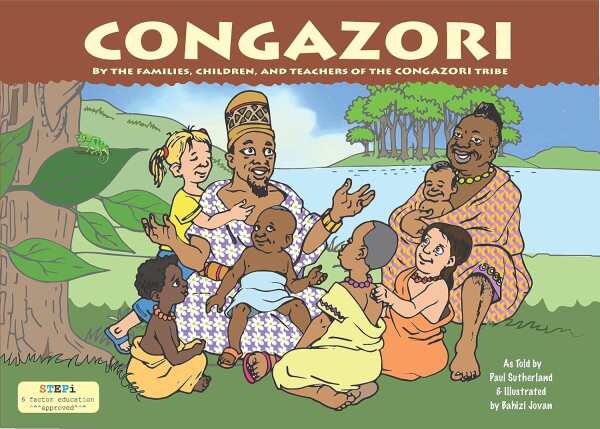Congazori
Congazori is an entertaining and informative glimpse of how families and communities can work together to solve relevant issues through considerate, nonviolent means.
A peaceful tribal community is threatened when trucks and machines move in, bringing pollution and destruction to their countryside, in Paul Sutherland’s Congazori, an inspirational African tale celebrating the transformational power of kindness, responsibility, and respect.
The children of the Kuzi-Kuzi family love many things about life in their lakeside home, from gathering gulu-gulu berries and collecting buzzy-buzzy honey to playing four-goal football and reading books. When workers come to extract the mysterious “yellow” from deep under the earth, Kuzi Boy and Kuzi Girl, along with their family, friends, teachers, and neighbors, unite to find a solution.
The Congazori tribe is a veritable utopian society. The land provides in abundance through fishing, farming, and gathering, and men, women, and children value happiness and peace. At first glance, it appears primitive, much like a traditional folktale with huts, river water bathing, campfires, and talking elephants. However, as the narrative progresses, elements filter in with references to current global constructs, such as the United Nations headquarters in New York City, and the children list Nelson Mandela, Martin Luther King Jr., Winston Churchill, Malala Yousafzai, and Mahatma Gandhi as role models. The result is a unique blend of rustic living in modern times.
Lessons are taught with sticks scratching in the mud, and the importance of education—reading in particular—is emphasized throughout in the clear enthusiasm that each child has for books and learning, but also in the insightful “Message from a Congazori Grandmother” appearing in the final pages. “Grandma’s Wisdom,” comprising eleven principles “to help the teachers learn to teach,” is a clever, motivational guide relevant for schools and educators in any setting.
As well educated as they are, Kuzi Boy and Kuzi Girl are confused by the harmful “yellow” miners with their rigs, pipelines, and factories. Amusing speculation as to what could be so valuable runs the gamut from honey to drops of the sun to bananas. The tribe’s ideas are constructive and positive—with the exception of Kuzi Boy’s humorous suggestion of pouring the yellow into the king’s bed—and include writing letters to politicians, giving speeches, taking a bicycle to work or walking instead of driving, and talking to reporters and newspapers, which seems out of place for the isolated tribe but in keeping with their respectful philosophy of life.
Colorful illustrations by Bahizi Jovan show the Congazori tribe dressed in a variety of native garb enjoying the river and lake as well as traveling across East Africa and beyond to share an important message about environmental awareness.
Congazori is an entertaining and informative glimpse of how families and communities can work together to solve relevant issues through considerate, nonviolent means.
Reviewed by
Pallas Gates McCorquodale
Disclosure: This article is not an endorsement, but a review. The publisher of this book provided free copies of the book and paid a small fee to have their book reviewed by a professional reviewer. Foreword Reviews and Clarion Reviews make no guarantee that the publisher will receive a positive review. Foreword Magazine, Inc. is disclosing this in accordance with the Federal Trade Commission’s 16 CFR, Part 255.

